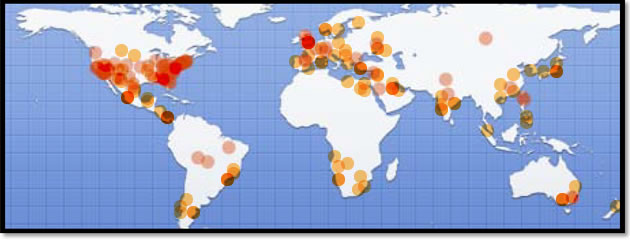Learning From Physicians Worldwide: Unhappy Patient? If You're In Mexico Just Call The Cops.
/
Medical Spa MD's physician community is worldwide. This poses some interesting challenges and some opportunities to learn how medicine is practiced elsewhere.
If you're not already aware, Medical Spa MD has physician members from 70+ countries... meaning that there are a number of differences in the way that medicine is practiced across the community. The map above shows some of the distribution of Members by location. The reason that I bring this up is to highlight that there are differences between where and how members of our community practice medicine.
Let me tell you a story or two about some of these differences.
In Mexico, plastic surgeons are less worried about being sued.
A few years ago at a major cosmetic medical conference in Las Vegas with very well known physicians presenting. I atteneded a presentation by a plastic surgeon from Mexico discussing one of the new (at that time) suture plication techniques for facelifts. I'll call the presenter Dr. M.
During this surgeons presentation, Dr. M discussed case study after case study in a way that made it apparent to every other doctor in the audience that he was in fact 'experimenting' on patients in order to guage how results would differ with different techniques.
Dr. M was detailing how he had arrived at what he felt was the optimial technique by identifying likely canditate patients, offering them a greatly reduced price, and then basically trying out a different technique to determine an outcome. The clear message was that he was just trying different things out to see what worked and what didn't work, i.e., experimenting on patients.
You could see a lot of slightly raised eyebrows in the room.
As is usual after a conference presentation, a group formed around Dr. M after his presentation to ask follow up questions or make a connection. After a couple of handshakes the questioning started to revolve around a very specific theme. The US physicians (the very clear majority since we were in Vegas) began asking questions that expresed a large amount of skepticism that they could have interpreted the presentation correctly. Namely, that any plastic surgeon could be performing experimental treatments on patients in the way that he'd described. (I should clearly state that Dr. M indicated that he clearly informed all of these patients of what he was doing and got their consent.)
The physicians weren't really challenging this physicians techniques or professionalism as much as questioning Dr. M about his patient practices and wondering how he could actually get away with this with his malpractice insurance and medical regluatory agencys.
The questions started to revolve around patients who were unhappy with their outcomes and how this physician was handling them. Dr. M freely admitted that there had been any number of failures and that some patients had had poor outcomes and were unhappy but expressed the sentiment that that was really not a big deal.
The US physicians were somewhat incredulous and one slightly exaperated physician asked, "What do you do if they come back to your office and complain?"
"We call the police," he said nonplussed.
Raised eyebrows all around.
Now, to be fair, Dr. M's answer was really based on his perception that the question was about a patient raising hell in his clinic and that answer would be the same answer that any physician would give, but the incredulity that prompted the question was really about how any doctor could get away with performing experimental procedures without being sued out of existence.
What's even more eye-opening to a lot of American physicians was that Dr. M had never been sued.
If you're a plastic surgeon in the US and you've been practicing for a while, the odds are good that you've been sued by a patient and if you're practicing new treatments that could be defined as experimental as a plastic surgeon, you're going to be sued... and dropped by your malpractice carrier. It seems that if you're a plastic surgeon in Mexico you don't have the same considerations to deal with.
Does it mean that plastic surgery outside the US is less safe? Possibly, since there's no other country that regulates the practice of medicine the way that the US does, but it's also the case that many of the 'medical tourism' destinations are staffed by US trained physicians. (If anyone has stats on this I'd be interested to see them.) There are a growing number of hospitals outsourcing xrays to radiologists in India, medical tourisim is increasingly mainstream, and US physicians are traveling outside of the US for trainings.
Medical Spa MD has members around the world. If you're smart, you'll take the opportunity to learn from everyone, no matter where they are.
Read: Plastic Surgery Malpractice Lawsuits In The US & Canada





